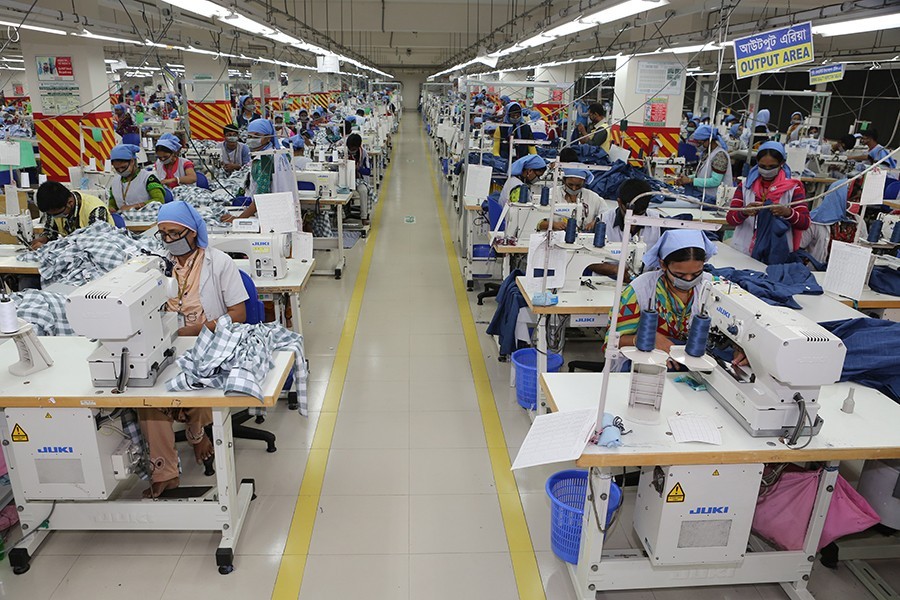Various types of tariffs and non-tariff barriers (NTBs) imposed by both India and Bangladesh impede the growth of bilateral trade and textile and clothing (TC) value chain engagement between the two countries, according to a latest World Bank report.
"Both the countries put a number of NTBs on TC products despite the agreement of cooperation between the Indian Bureau of Standards (BIS) and Bangladesh Standards and Testing Institution (BSTI)," the report said.
The report titled 'The Textile-Clothing Value Chain in India and Bangladesh: How Appropriate Policies Can Promote (or Inhibit) Trade and Investment' was launched early this month.
India specialises in the upstream segment, supplying such intermediate inputs as silk, cotton, yarn and fabrics to Bangladesh while Bangladesh specialises in the downstream final apparel segment, exporting worldwide as well as to India, it said.
"Tariffs and non-tariff barriers in both the countries inhibit the growth of value chain linkages."
Citing example, the report said that India has imposed a testing requirement for RMG products which is very complex due to the divergent testing procedures for specific ingredients of the product at the laboratory level in each country.
Furthermore, India also imposes a CVD (Countervailing Duty) of 16 per cent on RMG exports from Bangladesh to protect its domestic garment industry, it added.
Due to this, Bangladesh RMG (readymade garment) is yet to get effective access to Indian market, the report said.
In addition to this, India has also amended the registration rules for importing raw jute and jute products, making it mandatory for all importers to obtain a No Objection Certificate (NOC) from the Jute Commissioner of India for each consignment, said the report.
"The entire procedure of obtaining NOC is fraught with complexities and uncertainty, thus restricting the import of raw jute and jute products from Bangladesh."
Para-tariff barriers in India also affect the import of inputs for the export-oriented RMG industry of Bangladesh, the report said, adding that the prevalence of disguised trade barriers between the two countries inhibits the capacity of textile and clothing firms to engage efficiently in bilateral value chains.
Frequent changes in regulations, procedural issues, lack of regulatory convergence and information asymmetry act as major barriers for the textile and clothing manufactures on both sides, it pointed out.
Both the countries need to put due emphasis on promoting the convergence of trade and technical standards, certification requirements, and testing requirements through mutual recognition agreement (MRA), the report suggested.
"This can help both the countries assuage the high cost of compliance and can improve the cost competitiveness of small textile and clothing manufacturers.
"Reforms in trade policy (including rules of origin), trade facilitation, trade-related standards, and institutions could help both the countries better take advantage of value chain linkages."
The report also said India and Bangladesh introduced various schemes that have enabled them to eliminate, reduce or refund tariffs for exporters and duty drawback schemes perform better in Bangladesh than India.
Traders in India experienced a cumbersome and time-consuming procedure of duty drawback schemes, it added.
The report stressed the need for gradual reduction of tariffs through necessary reforms in the trade policy of Bangladesh, saying that the prevailing tariff on the import of inputs, such as yarn and fabric in Bangladesh, is high and impacts forward linkages of Bangladeshi RMG firms.
It recommended that Bangladesh should undertake policy measures to strengthen its specialisation in clothing, taking advantage from India's specialisation in textiles.
On the other hand, it said, India should undertake policy reforms to gradually eliminate incentives and subsidies, and remove NTBs gradually to improve efficiency and reduce distortions in the TC value chain.
Both the governments should explore all possible measures for trade and transport facilitation-related reforms for easy clearance of goods and seamless cross-border movement of cargo, said the report.
India and Bangladesh also should encourage the movement of goods through other cheaper modes of transportation, such as Inland Waterway and Sea, the report suggested, saying that the cost of road transportation is very high in both the countries.
The current Rules of Origin (RoO) under the South Asian Free Trade Area does not place any restriction on sourcing TC intermediate inputs from non-member countries, it said and suggested modification of the existing RoO.
Terming the procedures of opening the letter of credit 'cumbersome' for Bangladeshi TC exporters, the report said Bangladesh should allow the banks to open L/Cs for exporters without receiving the export order.


